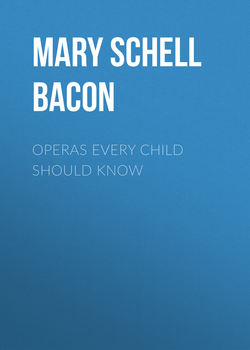Читать книгу Operas Every Child Should Know - Mary Schell Hoke Bacon - Страница 11
FLOTOW
ОглавлениеTHERE has never been more uncertainty and disagreement about the production, composition, and source of any opera than about the opera of "Martha." Among the reasonable guesses as to its source is one that Flotow found the theme for the story in a French ballet named "Lady Henriette, ou la Foire de Richmond," also, "Lady Harriette, ou la Servante de Greenwich." Among the German titles we find "Martha, oder der Markt zu Richmond," and "Martha, oder der Mägdemarkt zu Richmond." When all is said and done, it is still a German opera.
Flotow belonged to the petty nobility of Mecklenburg. He was destined for the diplomatic profession and his art work was continually interrupted by revolutions in his own country and in France.
He had already written a number of unimportant pieces before he undertook "Martha." This opera was made under particularly interesting circumstances, being originally the work of three composers. The Marquis Saint-Georges – the librettist of the day – asked Flotow to undertake the music of one act only, as the other two had already been assigned to two different composers. This proved to be on account of a contract made by the manager of the Grand Opéra with the French Government to produce a new ballet in three acts every year – and the Marquis had tried to evade the contract on the ground that it would bankrupt him. The manager's Première heard of this appeal, and she in her turn went to headquarters, asking that the manager be compelled to put on the piece as agreed. The next day he received an offer of 100,000 francs to mount the new ballet if he would put the dancer, Mlle. Dumilatre, into the leading part, and do it in an incredibly short time. This was how three composers brought into being the piece that one day was to become the "Martha" with which we are now familiar. After Flotow had written "Stradella" he was asked to write an opera for the court, and remembering the peculiarly carpentered piece, "Martha," he went to Saint-Georges's ballet for his court-opera theme. When finished it was "Martha."
The librettist for "Martha" and another Flotow piece was Reise, but he wrote under the name of W. Friedrich. Balfe used the story for an opera which he called "The Maid of Honour." The opera was about ten years in gaining popularity outside of Germany. It was perhaps somewhat longer than that in reaching Paris and London. It was known in New York, having been presented at Niblo's Garden, before it was known in Paris or London, and Madame Anna Bishop sang it. The great singers who have appeared in the cast are Anna Bishop, Mario, Lehman, Nilsson, Patti, Brignoli, and others.
Flotow's best claim to distinction lies in this opera of "Martha." He was not a special favourite nor a genius, but in "Martha" he turned out a number of fascinating tunes of a humable sort. One of them has been adapted to sacred words, and is much used in churches, but for the most part "Martha" is made of a series of jiggy choruses. Berlioz, who especially hated Flotow, declared that the "introduction of the Irish melody ('Last Rose of Summer') served to disinfect the rottenness of the Martha music."
Flotow was born April 27, 1812. Died January 24, 1883.
